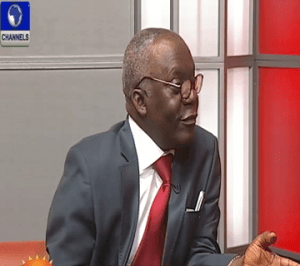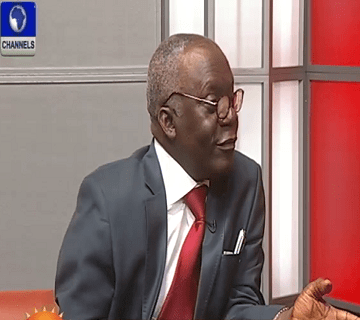
Falana, who was a guest on Sunrise Daily, described the act of parading suspects who have not been pronounced guilty by the Court, as illegal.
“Apart from the EFCC and the Customs, all law enforcement agencies in Nigeria engage in the illegal parade of criminal suspects,” he said, explaining that the act is “prejudicial to the right of the accused person’s right to fair hearing.
“When you arrest a suspect, before investigation, or in the middle of investigation, or even upon conclusion of investigation, you rush to the media to parade them (suspects) and tell the whole world (that), they’ve made confessions and statements.”
The trend, he said is contrary to the provisions of the right to fair hearing guaranteed by Section 36 of the 1999 Constitution and Article 7 of the African Charter on Human and Peoples Rights Act.
Falana went further to state that the illegal act was a “class matter” as the agencies usually parade poor individuals.
“If you look at it, it’s a class matter. You only parade the poor. I’ve never seen a situation where a former governor or a big shot in the society was paraded.”
“It’s limited to the poor. Armed robbery suspects, 419 boys (not the big ones), yahoo yahoo boys and ordinary people; but with respect to the rich, you dare not do that.”
Falana recounted an occasion when late Afrobeats icon, Fela Anikulapo Kuti, was paraded by the NDLEA, noting that, “that organisation regretted the action because we went to court and sued for colossal damages”.
“At that time (I think 1997) we were asking the NDLEA to pay a 100 million Naira for parading Fela”, who had signed an exhibit form and added “in chains” to show that he had signed under duress.
According to Falana, the prosecution team was forced to beg that the case be settled out of court, as Fela had made a mockery of the system.
The lawyer stated that the act of parading a suspect could be described as “trial by media”, noting that, upon conclusion of investigations, it may be revealed that the suspect is innocent and so he may be released, because he has not been charged to court.
The Police, or the State Security Service or any of the other agencies have no power to pronounce the guilt or otherwise of a suspect, because under our law, there is presumption of innocence which is in favour of a suspect.”
Hence, until a suspect is pronounced guilty or otherwise by a Court, after having gone through a trial, you dare not pronounce guilt, Falana noted, adding that most of the confessional statements obtained by the agencies are not admissible in court, because they are obtained by torture and all manner of illegal means.
Speaking on the Nigerian justice system, Falana talked about several laws which are not respected by security agencies, especially when poor people are concerned.
He noted that although it is not compulsory for persons taken to the Police Station to write statements, officers are known for torturing people who choose not to write them.
He also said that although the law allows an accused person to seek counsel from his lawyer before making any statement, the Police is known to bar lawyers from meeting their clients at the police station.
“All these rights are not respected, with respect to the poor but when it comes to the rich, you talk of “invitation”. You don’t invite the poor. You invade their houses and arrest them; But when the EFCC, the Police wants to have what they call interaction with a big man or a big woman, you write politely”, he said.

